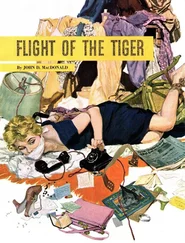Cordially and hopefully ,
G. Emmett Addyson, Deputy Director
I can make out, he thought. I can keep on doing what I am doing, which is, in effect, a one-man version of their Project Round-Table. In a world where the semantics of politics is like smoke in the wind, nothing is gained by ringing words, exhortation, cries of alarum. Facts move the world.
He turned back several pages and looked at one of the facts in the article he had just finished:
Just after dusk on November eighth last year an estimated seven tons of weapons and explosives was ferried ashore from the Polish freighter Trogir and offloaded on the beach five miles east of Rio Caribe on the Peninsula de Paris in the province of Sucre, where approximately twenty men with pack animals, under the direction of one Ramon Profeta, a Cuban national, accepted delivery and transported the material to a secret arsenal near Cumanacoa. Among the supplies were five 60-mm mortars of Chinese manufacture and four hundred rounds of ammunition, including one hundred white phosphorus mortar shells.
Orderly, triple-checked, plausible and ultimately provable, as was the shameful illiteracy rate in the Republic of Panama, the record infant-mortality rate, and the recorded voice of the President of the Republic saying, “The question is not whether we will have a Castro-type revolution, but when we will have it.”
But he yearned for access to the great flow of economic and sociological and political information the huge grant by the Waterman Foundation could create. Facts could then be interrelated, timetables predicted, causes isolated, countermeasures recommended. Facts in abundance, fed into the twin computers of the human mind and the transistor could illuminate all the misty patterns of conflict and change. Otherwise it was all blindfold chess where the opponent’s moves were neither announced nor recorded.
Yet he had promised, on his honor, to look after Francisca.
Just as he finished his penciled corrections, he heard the trumpet call of news once more and turned the volume up.
Furious debate in the Senate on the proposal to recruit mercenary combat battalions in Japan and the Philippines, uniform them in a distinct fashion to sustain nationalistic pride, staff the battalions with American officers, and use these people to fight the brushfire wars which were promising to last a hundred years, giving each man after twenty years of service the option to return to his home place, or accept United States citizenship. Mercenary was as dirty a word as empire.
And then the announcer said, “The official investigation and hearings on the Muñeca tragedy in the Bahamas which resulted in the death of Texas millionaire Bixby Kayd, his beautiful young second wife, his grown children, Stella and Roger, and his daughter’s
guest, Miss Leila Boylston of Harlingen, Texas, have now ended. Captain Garry Staniker has been cleared of any suspicion of negligence. His wife, Mary Jane Staniker, also perished in the explosion and fire which sank the yacht a few miles north of Andros Island on the night of the thirteenth, just two weeks ago today. Staniker, who was marooned for a week with serious injuries before being rescued by a pleasure boat out of Jacksonville, was earlier listed as being in critical condition, but improved rapidly enough to be interrogated earlier this week, and it is expected he will be released from the Princess Margaret Hospital at Nassau sometime next week. In a prepared statement released an hour ago, Captain Staniker said he was pleased at the decision of the Board of Inquiry and felt it was just and fair. He refused to answer any questions about the tragedy or about his future plans.”
Raoul Kelly tilted his chair back and slowly scratched at the sweat-damp bristle on his chin. Damn the pack-rat mind of the newspaperman, he thought. Grab everything that has a curious shine to it and stuff it into the back of the nest. And then, in odd moments, keep trying to fit the little pieces into a pattern.
After the weather news — thunderstorms during the night, clear and cooler tomorrow with a northeast wind — he turned the volume down. He had not gone hunting for background on the Staniker story, but he had read everything he had come across, from the two columns about Mister Bix in Time to Dud Weldon’s carefully researched history of Staniker’s maritime career in the Record .
He recalled the way, in Weldon’s feature story, Cristen Harkinson had given Staniker a clean bill, and that Weldon had not exercised his considerable talent for innuendo in trying to make something of the fact she had been Senator Fontaine’s special friend, and Kayd was known to have been associated in some vague business way with men Fontaine knew well. So it meant Weldon had put his own stamp of approval on the Harkinson woman.
There was a long scream of rubber, a janglingly expensive crunch. He leaned out of a window and saw two cars partway up the block, their front corners merged and locked in a tangle of torn metal, two men getting out of the two cars, starting to wave their fists at each other. Tempers ran short in this weather.
He turned his chair to sit facing his fan. He could not dismiss his uncomfortable awareness of certain facts which, had Dud Weldon known them, would have given him leverage for a far fatter feature.
Kayd had visited the Harkinson woman on the last day of March, over two weeks before he had returned aboard the Muñeca and hired Staniker. And Staniker and the Harkinson woman had been having a lengthy affair.
The Crissy-Staniker setup was not likely to be known. Even without the planned isolation of the house Fontaine had given her, an intimate arrangement between a woman and her hired captain was not anything which would be likely to attract any interest in the steamy social climate of the Miami area, even if the affair continued long after the lady had given up boating. It would be of moment only to those it happened to affect in some way — Crissy Harkinson, Garry Staniker, Francisca, Mary Jane Staniker and one sweaty Cuban newspaperman.
“And so what?” he said aloud. What has it got to do with anything? He’s been cleared.
And, of course, one could not take any chances with ’Cisca’s hard-won adjustment. The only possible reason for opening up the can of worms would be to find out if some sort of curious conspiracy had resulted in the sinking of the Muñeca. And, if so, the whole story would suddenly become twice as big as it had ever been. ’Cisca would have to testify as to Kayd’s visiting the house, as well as to the relationship between Crissy and the Captain. All news media would zero in on one emotionally disturbed girl, and they would unearth every portion of her personal history. It was obvious she could not endure that sort of exposure, that intensity of focus of public interest.
He leaned and picked up Addyson’s letter, scanned it again, flipped it back into the basket. Dilemma-time, he thought. Problems with no solutions.
Just as he was trying to stop thinking about the whole thing, an inadvertent process of logic took it one step further. If there was indeed some kind of dangerous and deadly motive underlying the loss of the Muñeca, it would surely occur to Staniker and the Harkinson woman that Francisca had seen Kayd in Crissy’s house, and that she could verify the Staniker-Harkinson relationship.
Assume a maximum shrewdness and deadliness, and you had to suppose that they would further guarantee their own safety by effectively silencing the little Cuban maid, no matter how stupid Crissy assumed her to be. In fact they might think stupidity more dangerous to them than guile. It would be natural to tidy up now the most immediate danger was over.
So get her out of there, Kelly, just in case. And before el Capitán returns to his pussycat.
Читать дальше






![Джон Макдональд - Wine of the Dreamers [= Planet of the Dreamers]](/books/430039/dzhon-makdonald-wine-of-the-dreamers-planet-of-thumb.webp)




![Джон Макдональд - The Hunted [Short Story]](/books/433679/dzhon-makdonald-the-hunted-short-story-thumb.webp)
